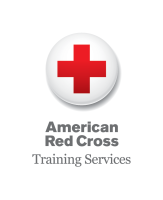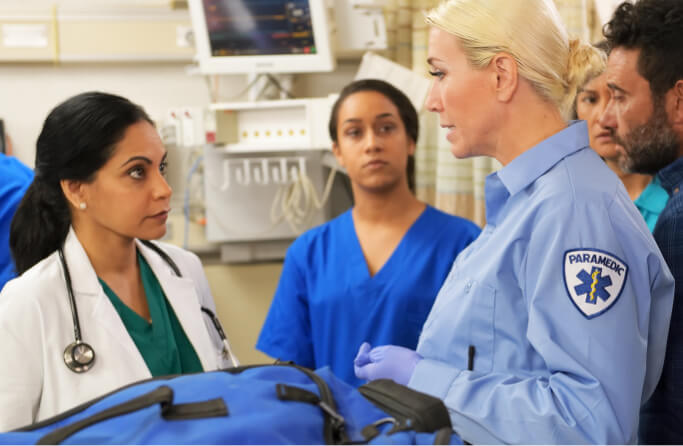-
Advanced Life Support (ALS) Certification
You now have a choice in healthcare education from the first provider of resuscitation training in the United States. The Advanced Life Support (ALS, sometimes referred as acls) class from the American Red Cross has been designed specifically for healthcare providers and first responders – and offers ways to help streamline your training, improve your skill retention and help you better serve your patients.
By building on your Basic Life Support (BLS) knowledge, our scientifically equivalent and educationally superior training emphasizes providing high-quality patient care by integrating rhythm interpretation, electrical interventions, and pharmacologic knowledge with critical thinking, problem-solving, and in-person psychomotor skills practice to achieve the best possible patient outcomes. Throughout the Red Cross ALS course, you'll learn advanced life support assessment, as well as how to best manage respiratory emergencies, and Advanced Cardiac Life Support (ACLS) protocols for acute arrhythmias, cardiac arrest (including post-cardiac arrest care), acute coronary syndromes and acute stroke within or outside of a medical facility setting.
Blended Learning and Streamlined Options for Experienced Providers
Advanced Life Support (sometimes referred as advanced cardiac life support, or acls) classes are available via our innovative Blended Learning program, which combines online training coursework with an in-person skills session – so you can take them when and where you like – and on the device that suits you best. Throughout the course, our interactive scenarios will help you understand the science behind ALS and the finer points of providing care, and improve your clinical decision-making skills. With the online class complete, and after passing your final written exam, you'll attend an in-person skills session – where you'll meet with a certified ALS/ACLS Red Cross instructor and demonstrate your ALS skills. After passing both sections of the course, you'll receive a two-year ALS certificate.
Personalized Instruction & Time-Saving ALS Pre-Assessments
As part of the Blended Learning experience, our ALS class features adaptive learning technology. By using this groundbreaking technology, you'll not only follow a personalized learning path, but you'll have the option to test out of sessions if you demonstrate competency. It’s an innovative way to reduce your overall class time and help you earn your ALS certification (sometimes referred as acls certification) faster.
Experienced ALS Providers
If you're an experienced ALS provider, the Red Cross gives you the option to renew your ALS certification even faster. With the opportunity to do a brief, in-person skills review before testing (Review Option), or simply move straight to the Challenge Option and immediately take the skills test, you can get your ALS and ACLS recertified in less time.
Should I Enroll in an ALS Class?
![enroll in als]()
Advanced Life Support courses are designed for professional healthcare providers who participate in the assessment and management of critical patients, including those working in in-hospital, pre-hospital, and out-of-hospital medical facilities.
The only prerequisite for enrollment is that you must be proficient in adult basic life support (BLS) skills.
FAQs
What is the difference between ALS vs. BLS?
- Basic Life Support (BLS) is the foundation of resuscitation training for healthcare professionals including nurses, physicians, EMS professionals, and other healthcare and public safety personnel. The Advanced Life Support (ALS) program builds on the skills learned in BLS, training healthcare providers to care for adult patients who are experiencing life-threatening emergencies such as cardiac arrest, acute coronary syndrome, or stroke.
What is the difference between ALS vs. ACLS?
- ALS (Advanced Life Support) is often used interchangeably with the term ACLS (Advanced Cardiovascular Life Support). Advanced Life Support is the name of the ILCOR taskforce that produces Consensus on Science with Treatment Recommendations in this subject area. Red Cross Advanced Life Support goes beyond a cardiac focus.
What is the difference between ALS (ACLS) vs. BLS vs. PALS?
- These three courses are part of the Red Cross Resuscitation Suite™ program.
- Basic Life Support (BLS) Program
- Basic Life Support (BLS) is the foundation of resuscitation training for healthcare professionals including nurses, physicians, EMS professionals, and other healthcare and public safety personnel. BLS program content includes single-and multiple-responder CPR (cardiopulmonary resuscitation) and AED (automatic external defibrillator) use, as well as how to care for a patient who has an obstructed airway (choking).
- Adult and Pediatric Care includes: Cardiac Arrest, Respiratory Arrest, Airway Obstruction and Opioid Overdose.
- Adult and Pediatric Skills include: High-quality CPR and AED Use, Obstructed Airway and BLS Team Response.
- Basic Life Support (BLS) is the foundation of resuscitation training for healthcare professionals including nurses, physicians, EMS professionals, and other healthcare and public safety personnel. BLS program content includes single-and multiple-responder CPR (cardiopulmonary resuscitation) and AED (automatic external defibrillator) use, as well as how to care for a patient who has an obstructed airway (choking).
- Advanced Life Support (ALS) Program
- The ALS program trains healthcare providers to care for adult patients who are experiencing life-threatening emergencies such as cardiac arrest, acute coronary syndrome, or stroke.
- Adult Care includes: BLS Review, Respiratory Emergencies, Arrythmias, Cardiac Arrest and Post-Cardiac Arrest Care, Acute Coronary Syndrome and Stroke.
- Adult Skills include: BLS: High-quality CPR, Managing the Airway, Electrical Therapies, Intraosseous Access and ALS Team Response.
- The ALS program trains healthcare providers to care for adult patients who are experiencing life-threatening emergencies such as cardiac arrest, acute coronary syndrome, or stroke.
- Pediatric Advanced Life Support (PALS) Program
- The PALS program trains healthcare providers to care for pediatric patients who are experiencing life-threatening emergencies such as cardiac arrest, respiratory emergencies and shock.
- Pediatric Care includes: BLS Review, Respiratory Emergencies, Arrythmias, Cardiac Arrest and Post-Cardiac Arrest Care and Shock.
- Pediatric Skills includes: BLS for Children and Infants: High-quality CPR, Electrical Therapies, Intraosseous Access and PALS Team Response.
- The PALS program trains healthcare providers to care for pediatric patients who are experiencing life-threatening emergencies such as cardiac arrest, respiratory emergencies and shock.
- Basic Life Support (BLS) Program
What is the difference between ALS vs. PALS?
- Advanced Life Support (ALS) focuses on advance cardiac care for the adult patient whereas Pediatric Advanced Life Support (PALS) focuses on advanced cardiac care for the pediatric patient.


